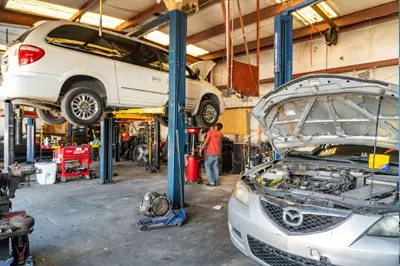All Categories
Featured

Your car's engine is the heart of your lorry, and maintaining it in top condition is necessary for optimal performance and longevity. Regular engine tune-ups are a wonderful method to maintain your vehicle's health and wellness, enhance fuel performance, and prevent costly repair services later on. Whether you're an auto enthusiast or somebody who simply intends to maintain their lorry running smoothly, these engine tune-up pointers will certainly aid you obtain one of the most out of your vehicle.
- Replace Flicker Plugs. Ignition system play an important duty in starting your engine and ensuring smooth combustion. In time, spark plugs can come to be unclean or broken, bring about misfires, minimized gas performance, and harsh idling.
During an engine tune-up, inspect and replace your trigger plugs if needed. The majority of automobiles need new trigger plugs every 30,000 to 100,000 miles, depending upon the kind. Frequently changing ignition system guarantees appropriate ignition and ideal engine performance.
- Inspect and Clean the Air Filter. The air filter protects against dirt, dust, and particles from entering your engine. A clogged or dirty air filter restricts air flow, causing your engine to function more difficult and melt even more gas.
Inspect your air filter during a tune-up and change it if it's dirty. In dirty environments or locations with heavy contamination, you might need to change the air filter extra often. A tidy air filter can improve fuel performance and prolong the life of your engine.
- Evaluate and Change Belts and Hoses. Belts and hose pipes are vital for numerous engine features, such as powering the generator, water pump, and a/c system. With time, these components can split, battle royal, or wear out, potentially leading to malfunctions.
During a tune-up, check belts and hose pipes for signs of wear and replace them if needed. Replacing these parts proactively can conserve you from pricey repair work and prevent unexpected failings.
- Tidy the Gas System. Your fuel system, including the fuel injectors and gas lines, can collect dust and carbon down payments in time, decreasing engine effectiveness. Cleaning the gas system throughout a tune-up assists improve efficiency and gas economy.
You can utilize a gas system cleaner or have a professional mechanic perform a much more thorough cleaning. This action is specifically important for older cars or autos that often drive in stop-and-go web traffic.
- Examine the Battery and Billing System. A healthy battery is essential for starting your engine and powering electrical components. Throughout a tune-up, check the battery terminals for corrosion and guarantee the links are limited.
Examine the battery's voltage and change it if it shows indicators of weakness. In addition, have the alternator and charging system evaluated to guarantee your battery remains charged throughout procedure.
- Modification the Engine Oil and Oil Filter. Oil adjustments are a fundamental part of engine maintenance. Engine oil lubricates moving components, lowers friction, and assists manage engine temperature. In time, oil ends up being infected and sheds its performance.
During a tune-up, change the engine oil and oil filter to maintain your engine running smoothly. Follow your automobile's manufacturer suggestions for oil type and change intervals.
- Check the Cooling System. The cooling system avoids your engine from overheating. In time, coolant can deteriorate or become infected, decreasing its performance.
Examine the coolant level and problem during a tune-up, and flush and replace it if required. Check the radiator, water pump, and pipes for leakages or damage. A well-kept air conditioning system assists your engine run at the ideal temperature level and protects against getting too hot.
- Evaluate the Ignition System. A defective ignition system can trigger starting concerns and decreased engine efficiency. Throughout a tune-up, inspect the ignition coils, distributor cap, and blades (if suitable) Change any elements that reveal indicators of wear or damage to guarantee smooth and reliable engine procedure.
- Pay Attention for Uncommon Sounds. Throughout a tune-up, seize the day to pay attention for any type of unusual engine noises, such as knocking, ticking, or hissing. These audios can indicate underlying issues, such as valve issues, loosened elements, or exhaust leaks. Addressing these issues early can protect against extra substantial damages.
- Usage Top Quality Components and Fluids. When performing an engine tune-up, always use premium parts and fluids that fulfill your lorry supplier's specs. Economical or wrong elements can jeopardize your engine's efficiency and dependability.
Verdict: A Well-Tuned Engine is Key to Durability. Regular engine tune-ups are crucial for preserving your automobile's performance, performance, and integrity. By changing used components, cleaning up vital systems, and attending to prospective issues, you can maintain your engine running smoothly for many years ahead. Whether you're doing it yourself or relying on a trusted auto mechanic, purchasing tune-ups is a smart method to protect your automobile and take pleasure in a safer, smoother ride.
Latest Posts
Find Out Why Chicago Drivers Select Montclare Auto Repair for Reliable Service and Significant Savings
Uncover Premier Auto Repair Care offered by Montclare Auto Repair – Keep Your Car Running Smoothly
Discover Reduce Expenses on Car Maintenance with Montclare Auto Repair’s Limited-Time Deals
More
Latest Posts
Find Out Why Chicago Drivers Select Montclare Auto Repair for Reliable Service and Significant Savings
Uncover Premier Auto Repair Care offered by Montclare Auto Repair – Keep Your Car Running Smoothly
Discover Reduce Expenses on Car Maintenance with Montclare Auto Repair’s Limited-Time Deals